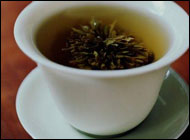Green tea may lengthen life span
More good news for tea lovers - green tea may be as good for your health as it is to your taste buds, according to new study findings.
The data show that Japanese adults who consumed the most green tea over an 11-year period were less likely to die from cardiovascular disease or any other cause, except cancer, than were the less-frequent green tea drinkers.
“Green tea may prolong your life through reducing the risk of cardiovascular disease,” study author Dr. Shinichi Kuriyama, of Tohoku University Graduate School of Medicine, in Sendai, told Reuters Health.
However, because this was an observational study, the debate on the effects of green tea on heart disease and cancer is not over, Kuriyama added.
Although laboratory and animal studies have shown that the polyphenols in green tea may be protective against cardiovascular disease and cancer, it is not clear if these findings extend to humans. The few clinical trials that have been conducted were small and yielded inconsistent results. 
To further explore the topic, Kuriyama and colleagues analyzed information on 40,530 Japanese adults, 40 to 79 years old, who participated in the Ohsaki National Health Insurance Cohort Study. The subjects, who were followed from 1995 to 2005, were from a northeastern region of the country where most of the adults drink green tea three or more times per day. None of the study participants had a history of stroke, coronary heart disease or cancer.
After 11 years, 4,209 adults had died. During the 7 years in which the researchers tracked the number of deaths due to specific causes, 1,134 individuals succumbed to cancer and 892 died from cardiovascular disease.
Adults who drank the most green tea were the least likely to die from cardiovascular disease - especially stroke, the researchers report in this week’s issue of the Journal of the American Medical Association.
The decreased risk of death was particularly true among women, Kuriyama and colleagues note. Men who consumed at least five cups of green tea each day were 12 percent less likely to die from any cause. Whereas, women who drank five or more cups of green tea each day were 23 percent less likely to die from any cause and 31 percent less likely to die from cardiovascular disease.
Yet, higher green tea consumption did not appear to be related to a lower risk of death from cancer, study findings indicate.
The reason for the lower risk of death among women drinkers of green tea is unclear, but Kuriyama speculates it may have something to do with the higher smoking rates observed among Japanese men.
“These results suggest that higher rates of smoking may mask the associations of green tea consumption with cardiovascular disease mortality among men,” the researcher told Reuters Health.
In addition to providing more evidence on the benefits of green tea, the current findings also “might explain the ecological observation of the differences in mortality profile between Japan and the United States,” Kuriyama noted.
SOURCE: Journal of the American Medical Association, September 13, 2006.
Revision date: July 8, 2011
Last revised: by Sebastian Scheller, MD, ScD